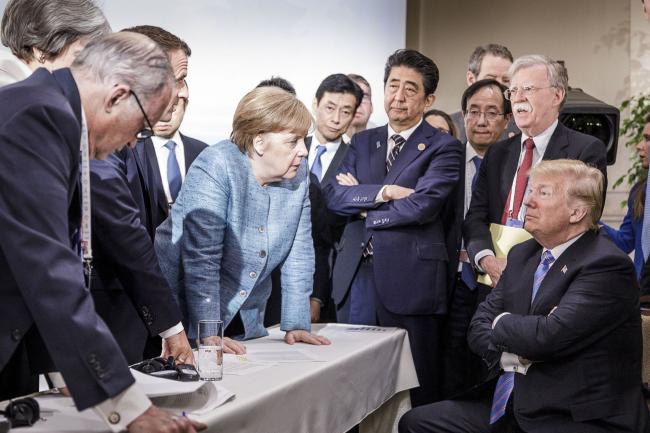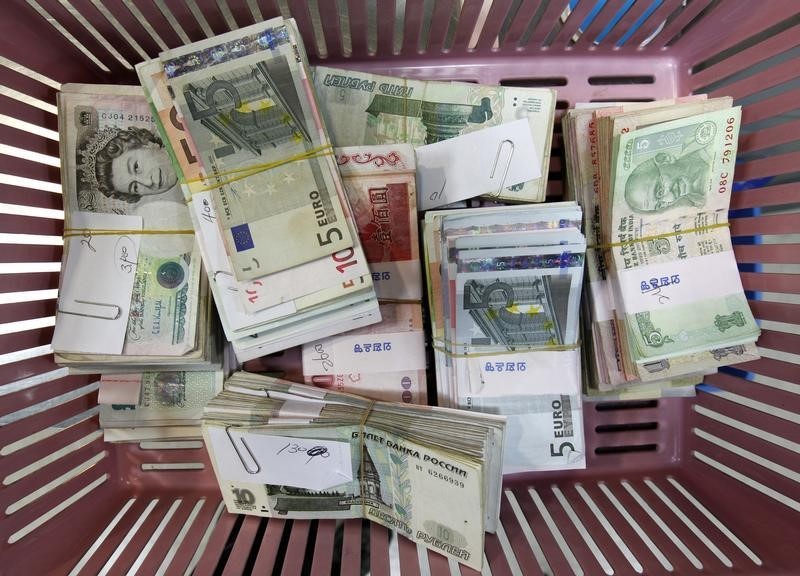(Bloomberg) -- U.K. Prime Minister Boris Johnson is trying to craft the perfect Group of Seven summit image of Britain presiding over a united global effort to fight Covid and climate change, but the optics of these gatherings have always been unpredictable. These events are all about those optics — charting who is on the ascent and who is going in reverse. Canada went down in history in 2018 as that moment when a fed-up Angela Merkel stood leaning forward, arms braced on a table, alongside other leaders facing a cranky Donald Trump to convince him to sign onto a communique he later ripped up anyway.
Italy the previous year was all about the nascent bromance of Emmanuel Macron and Justin Trudeau, both fresh on the scene and with wind in their sails. France in 2019 marked the debut of Johnson, who broke the Brexit ice with allies with a lovely bit of slapstick. The power dynamics can shift, and reveal a lot about the geopolitics at play.
It’s been two years since they’ve all been able to come together in person. The pandemic changed everything and this year, off the rugged English coast jutting into the Atlantic, a new set of characters will join the cast while the doyenne of the group will make her last appearance.
Here is your guide on who is coming and what they want.
Joe Biden: The (Experienced) Rookie
He’s not Trump, and for some that may be enough. President Joe Biden is also a familiar figure, having been the “veep” to Barack Obama. But this is his first summit as president at a time the U.S. is reconsidering its role as the world’s policeman. Biden comes in with the clear message that “America is back” but also aspects of “America First” are here to stay. At home, his vaccination campaign soared but abroad there is anger at the hoarding of shots — a headwind he sought to quell by announcing a plan on the eve of the summit to donate 500 million doses. He wants an investigation into the origins of the coronavirus and he’s now got backing on that.
His push to raise corporate taxes was also endorsed and while the U.K. is host nation to the annual global climate talks later this year, Biden already held his own summit on the subject. One early test will be how much support he can rally from allies to form a united front on China, poised to become the world’s biggest economy within a much shorter timeframe (in part because of the pandemic). Another will be how he responds to a more assertive approach from European leaders, who may be skeptical of his ability to deliver on long-term promises. Biden will also be looking forward to his meeting with Russian President Vladimir Putin on June 16, probably the defining leg of his overseas jaunt. Before that he may want to pick the brain of Merkel, the closest thing these decision-makers have to a Kremlinologist.
What to expect: Biden is a welcome change, for sure, but Europeans are not yet ready to trust him completely.
Boris Johnson: The Brexit Man
The British leader picked a resort where he can entertain his counterparts in the style of a traditional English seaside holiday. If only the awful weather hadn’t scuppered the best-laid plans for tea with Biden at a quirky castle on a tidal island. No matter. Johnson will show off his famously sunny outlook as he tries to sell his vision of Brexit Britain as a global nation trading across the world. Behind the bonhomie, there is serious work to be done. His team is proud of a landmark global tax deal struck in London and has its sights on efforts to help vaccinate the whole world by the end of next year.
On climate change, Johnson will be relentless. He is hosting the United Nations climate summit in November and at home has set the kind of carbon reduction targets he also wants the G-7 to embrace. A proposal to do away with polluting cars will test how successful he is. There is the prospect of tension, though. On China, Johnson wants to balance criticism of Beijing’s human rights record with openness to trade and the U.K.’s European divorce has soured his relations with other leaders. A dispute over trade rules for Northern Ireland will simmer on the sidelines and Johnson’s aim will be to stop it boiling over.What to expect: Amid photo shoots on the beach, Johnson will have one eye on that summit in Glasgow. And he’ll want Biden to persuade leaders to make sure climate talks deliver a planet-saving deal later in the year.
Angela Merkel: The Outgoing Veteran
Wherever Merkel goes these days, chances are high that someone feels obliged to give her a farewell speech. Or even worse, a goodbye present. But the German chancellor, known for her no-nonsense style, is visibly uncomfortable in such situations and, more to the point, has little time for such sentimentality. In Cornwall, given this will be her last G-7 summit after 16 years in the driving seat of Europe’s economic motor, she’ll have to suffer through some of that. But Merkel still has strong political objectives, despite the fact that she’ll cede the throne after the national election in September.
High on her agenda is how to redefine the relationship with China — German companies depend on this market for their exports of high-end consumer goods — and Russia. Merkel grew up in East Germany and learned to speak Russian fluently. It gave her an edge when it came to connecting to Putin. Over the years she’s seen Russian aggression in Crimea and Syria and how Moscow stood by Belarus with the forced diversion of a plane and the capture of a dissident. She’s seen the limits of what sanctions can do to bring rogue nations to heel and she’s seen with the Trump era the end of what she calls the postwar order.
What to expect: Uncensored advice to Biden and a proper show of European unity.
Mario Draghi: The New Heavyweight
Italians rarely have a big say at the G-7. There is a bit of an imposter’s syndrome at play because Italy always came across as a junior member of an elite club of developed countries, with an economy stagnant for decades. Historically Italy has either done the bidding of the U.S. (it owes its 1960s boom to the Marshall plan) or aligned itself very closely to Germany and France, the continent’s dominant voice once the European Union began to take form. But this time, it’s different. They have Draghi, a gold-plated powerhouse with the kind of experience and effortless gravitas many of his contemporaries will envy. During the Greek crisis, investors saw him as the one who saved the euro.
When he was picked to become a caretaker prime minister in Italy, the former head of the European Central Bank immediately showed his political chops by being first off the gate to impose an EU export ban to counter the bloc’s slowness in getting its people vaccinated. When it comes to Beijing, he set the tone by reversing his predecessor’s embrace of Chinese investment. On climate, there is much more ambivalence because going green is costly and Italy doesn’t have money to spare. However, Draghi is fully aware of the reputational damage of not being on the right side of history when it comes to the environment, especially as Italy is hosting the G-20, where another important milestone will need to be set: a wider consensus on corporate taxes.
What to expect: When Draghi speaks, especially on economic recovery, everyone will go quiet and listen.
Emmanuel Macron: Limelight-Seeking Liberal Champion
Macron, the youngest French head of state since Napoleon, does not lack confidence. He’s an unapologetic globalist whose vision of Europe with its own army leaves even the most passionate Europhiles uneasy. When he met Trump, he gave him such a long and firm handshake the then-president’s knuckles went white. And yet, for all that early promise, Macron has had his share of stumbles. At home, protesters became a frequent presence in Paris over rising living costs and the beheading of a teacher raised questions about the integration of Muslims. Abroad, France’s complicated colonial legacy in Africa is coming to a head with the likely reduction of its military presence in the Sahel.
For all the efforts to reason with Trump, Macron never really made much headway, the relationship with the U.K. has been antagonistic in light of Brexit, and his handling of the pandemic has drawn criticism. Five years is a long time in politics and he’s now facing a difficult re-election campaign with far-right candidate Marine Le Pen forcing him to calibrate his stance on immigration. With Merkel departing, Macron will seek to seek to replace her as the U.S. point person for Europe. To do so, he’ll need to earn Biden’s trust and that will involve not coming on too strong.
What to expect: Macron loves to lecture — he did so as host in Biarritz — but that can be a turnoff.
Justin Trudeau: Laying Low
The Canadian prime minister has been in power for more than five years. Once upon at time he was a darling of social media with his youthful good looks and can-do optimism. These days he sports a graying beard and has become something of a footnote. Trump called him “weak” and pulled out of the joint communique agreed in Quebec. The arrest of a top executive at Chinese telecom giant Huawei resulted in Canada being on the receiving end of Beijing’s wrath, and there was a bungled trip to India to boot.
Trudeau has struggled to respond given Canada’s reliance on the U.S. and China for trade. He’ll get behind any initiative on China but, having been burned before, is not seeking the limelight. Canada is at the forefront of many a climate initiative and while he’d love the G-7 to get radical he probably knows by now that he’s got limited scope to really influence the debate in tangible ways.
What to expect: Happy to make positive sounds on climate.
Yoshihide Suga: The First Timer
Suga was a long-time top aide to Prime Minister Shinzo Abe who took the reins last year after he stepped down citing health reasons. He’s found himself saddled with all sorts of problems, from whether or not to go ahead with hosting an already-delayed summer Olympics during a pandemic to overseeing a vaccination campaign that took months to get into gear in one of the most densely populated countries on earth with a high concentration of elderly people.
Abe was Japan’s longest-serving postwar leader and carved out a bond with Trump while lending his name to a series of policies designed to pull the economy out of its deflationary funk. Suga is making a tentative debut on the international stage and, just a month out from the Tokyo games (and with an election looming), he’ll be looking for support to make sure the event is not a bust. He may even be handing out invitations to the opening ceremony.
What to expect: Success will be measured by photo shoots with other world leaders.
©2021 Bloomberg L.P.

